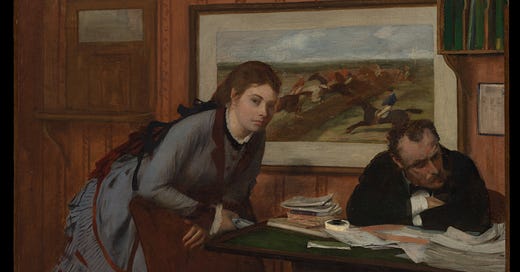A few days ago my favorite literary publication, The Republic of Letters, shared an essay I wrote. The question I try to answer there is: If an entire category of previously unacceptable speech is now becoming permissible, what should the Great Millennial Novelist say if he wants his words to last? Here’s the intro:
It’s hard to pinpoint the exact beginning of shifts, but the first evidence I encountered of literary culture changing was last December. After young men swung thirty-points from Biden to Trump, the Democrats begrudgingly realized that they couldn’t keep telling half the population — well not half, I suppose, just white men — that, at minimum, they didn’t care about them; at maximum that they were responsible for almost every historical sin, that they should be quiet because they have nothing to complain about, and that their very masculinity was not uselessly benign but actively poisonous. Not a good campaign strategy. One month after their defeat, the party’s mouthpiece, also known as The New York Times, sprung into action. They looked over their captives and, after careful deliberation, took the muzzle off one in particular: David J. Morris. An ex-marine and war correspondent, Morris is, in all likelihood, a badass. But he is also an MFA teacher who writes for the Times, which means that he’s required by editorial law to slap himself after every true sentence (slap-bolding mine):
In 2022 the novelist Joyce Carol Oates wrote on Twitter that “a friend who is a literary agent told me that he cannot even get editors to read first novels by young white male writers, no matter how good.” The public response to Ms. Oates’s comment was swift and cutting — not entirely without reason, as the book world does remain overwhelmingly white. But the lack of concern about the fate of male writers was striking.
To be clear, I welcome the end of male dominance in literature. Men ruled the roost for far too long, too often at the expense of great women writers who ought to have been read instead. I also don’t think that men deserve to be better represented in literary fiction.
His piece, “The Disappearance of Literary Men Should Worry Everyone,” was comically meek and entirely tormented. Morris must have felt like the first to go cliff-diving into unknown waters that are rumored to be infested by sharks. But he deserves credit for opening the doors to less self-flagellating writers, like Jacob Savage, who recently published “The Vanishing White Male Writer” in Compact Magazine. Objective and unafraid, Savage states public data that quantifies what everyone knows: Over the last few years, young white men have been intentionally exiled from the literary industry. Twelve months back, it would have been as advisable for a writer to cite this data as it would be for him to lick a leper. But no one, as far as I’ve seen, is coming after Savage the way they once went after Alex Perez. The last time he opened his mouth, an entire magazine shut down. Now, apparently, they want to talk to him too.
It’s still too early to celebrate. One doesn’t know where the lines will be drawn, or where culture will take us. The current administration, after all, is deporting people for speech they disagree with. But even if the Overton window shifts without expanding — still terrible, to be clear — it remains true that an entire category of previously unacceptable speech may become permissible. The heterodox millennial writer, who has been silenced for what was supposed to be the prime of his career, might soon be given a stage to speak on. If he wants his words to last, what should he say?
If you want to keep reading, you can check it out on The Republic of Letters’ page:





I was trolled by a female with an MFA for daring to point out that nearly all the young apprentice acquisitions editors in publishing today are young women from private universities who are financially dependent on their parents. She was shocked!! shocked! I tell you that I could insist that publishing was so uniformly one-sided. Was I some lunatic Trump supporter? Later she came back to me after she looked up some actual data and reported that I was right, few men fill junior roles in publishing. Homogeneity in the industry is a problem and idiots teaching the young are an even bigger problem. Not everything is a partisan issue, nor should it be. Literary fiction is one of those things.